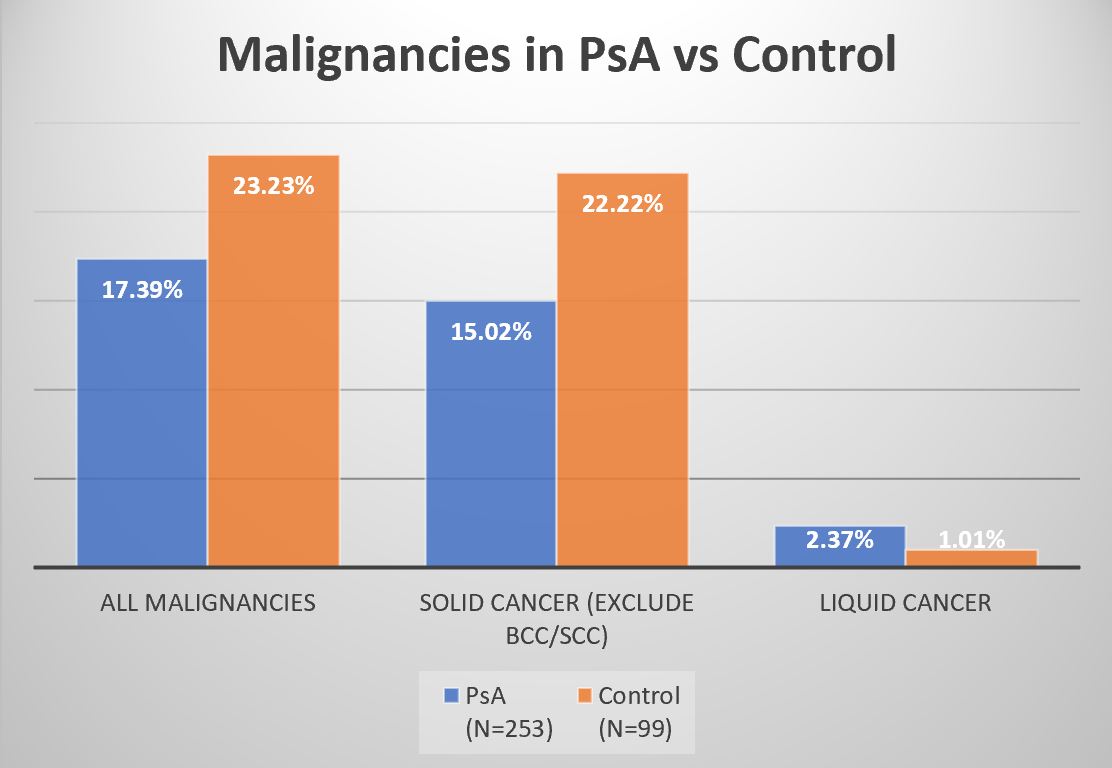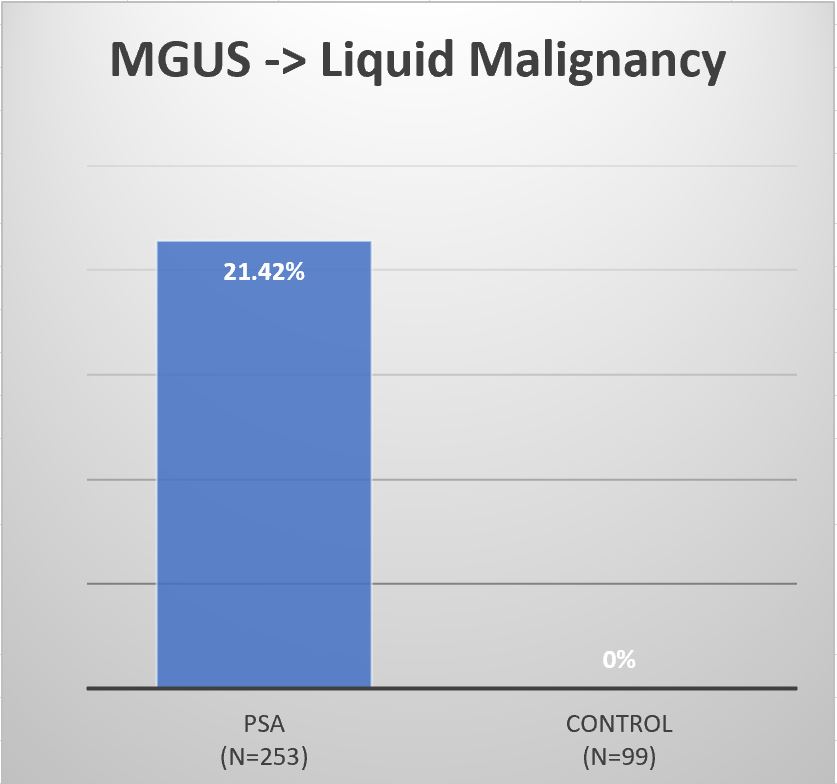Session Information
Date: Friday, November 6, 2020
Session Type: Poster Session A
Session Time: 9:00AM-11:00AM
Background/Purpose: Psoriatic arthritis (PsA) is a systemic inflammatory disease that involves musculoskeletal and skin manifestations. Such autoimmune disease has been associated with increased lymphoproliferative disease risk, which is thought to be due to abnormal immune activation and/or continual exposure of systemic immunosuppressive therapies. Such risk is well established in psoriasis but is still unclear in PsA. This study was undertaken to investigate the risk of developing lymphoproliferative disorders among patients with PsA.
Methods: A multicenter retrospective study involving two Veterans Affairs (VA) Hospitals in Southern California, namely Long Beach and Greater Los Angeles, was performed. Patients with PsA were assembled using the ICD 9 and 10 coding from 2000 to 2019 (n=253) compared against controls (n=99) without autoimmune diseases that were matched in age, sex and race. Outcome measures were the number of patients who developed malignancies (excluding skin basal cell carcinoma and squamous cell carcinoma) and the number who had abnormal serum protein electrophoresis (SPEP). The Odds Ratio (OR) for developing abnormal SPEP, including polyclonal and monoclonal gammopathy (MGUS), as well as solid and liquid cancers (lymphoma or leukemia) were calculated. Additionally, the percentage of MGUS patients progressing to develop lymphoproliferative malignancies was compared.
Results: PsA patients were at least twice more likely to develop abnormal SPEP (OR 2.36, CI 1.08-5.15), and in particular, polyclonal gammopathy (OR 2.74, CI 1.12-6.70), compared to controls. The prevalence of MGUS was 5.5% in PsA patients versus 2.0% in controls (OR 2.84, CI 0.63-12.74). There was no significant difference in the risk of developing any kind of malignancies, however there was a trend of a slightly higher number of PsA patients with liquid cancers than solid tumors. Among PsA patients with MGUS, approximately 20% eventually developed lymphoproliferative cancers but none in the controls. However, the sample size was too small to reach statistical significance.
Conclusion: PsA patients have a higher risk of developing polyclonal gammopathy, likely due to abnormal immune activation of the disease and chronic inflammation. More PsA patients developed MGUS, and possibly with an increased propensity to progress to lymphoproliferative malignancy, which requires validation with a larger cohort. Additional studies on immunosuppressive therapies, disease activity and inflammatory markers are underway to elucidate their correlation with lymphoproliferative cancer risk in PsA patients. Malignancy screening by SPEP on a regular basis may be beneficial to PsA patients, especially for those who have MGUS.
 The risk of developing abnormal SPEP and polyclonal gammopathy were both significantly higher in PsA patients compared to controls with p < 0.05. The prevalence of MGUS was 5.5% among PsA patients, while 2% among controls, with p value close to but not statistically significant.
The risk of developing abnormal SPEP and polyclonal gammopathy were both significantly higher in PsA patients compared to controls with p < 0.05. The prevalence of MGUS was 5.5% among PsA patients, while 2% among controls, with p value close to but not statistically significant.
 There was no significant difference in the risk of developing malignancies in PsA patients vs controls. However, we observed a trend of slightly higher liquid cancer risk in PsA patients, but not solid tumors.
There was no significant difference in the risk of developing malignancies in PsA patients vs controls. However, we observed a trend of slightly higher liquid cancer risk in PsA patients, but not solid tumors.
 Among PsA patients with MGUS, approximately 20% eventually developed lymphoproliferative cancers but none in the controls. However, the sample size was too small to reach statistical significance.
Among PsA patients with MGUS, approximately 20% eventually developed lymphoproliferative cancers but none in the controls. However, the sample size was too small to reach statistical significance.
To cite this abstract in AMA style:
Chen E, Wong M. Increased Risk of Lymphoproliferative Disorders in Psoriatic Arthritis [abstract]. Arthritis Rheumatol. 2020; 72 (suppl 10). https://acrabstracts.org/abstract/increased-risk-of-lymphoproliferative-disorders-in-psoriatic-arthritis/. Accessed .« Back to ACR Convergence 2020
ACR Meeting Abstracts - https://acrabstracts.org/abstract/increased-risk-of-lymphoproliferative-disorders-in-psoriatic-arthritis/
